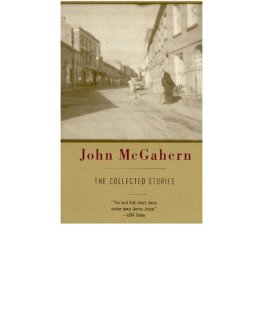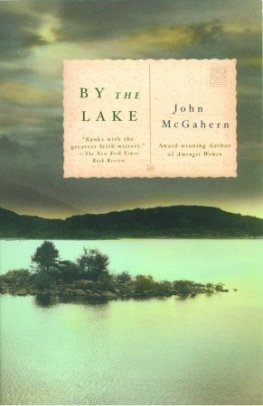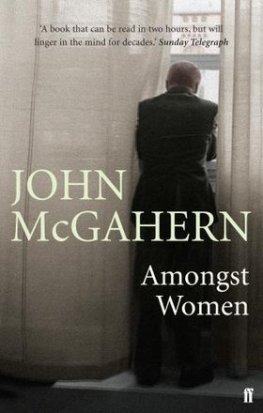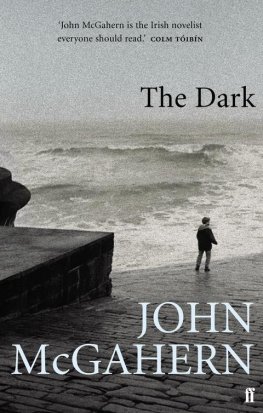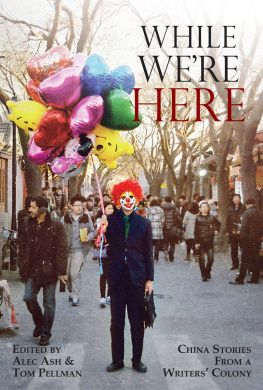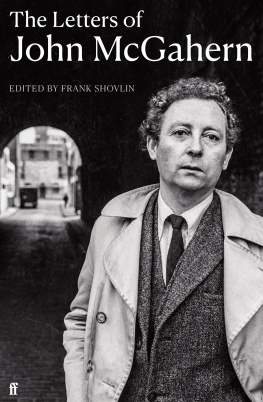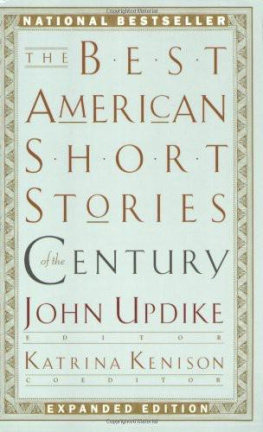John McGahern - The Collected Stories
Here you can read online John McGahern - The Collected Stories full text of the book (entire story) in english for free. Download pdf and epub, get meaning, cover and reviews about this ebook. year: 2015, publisher: Vintage, genre: Prose. Description of the work, (preface) as well as reviews are available. Best literature library LitArk.com created for fans of good reading and offers a wide selection of genres:
Romance novel
Science fiction
Adventure
Detective
Science
History
Home and family
Prose
Art
Politics
Computer
Non-fiction
Religion
Business
Children
Humor
Choose a favorite category and find really read worthwhile books. Enjoy immersion in the world of imagination, feel the emotions of the characters or learn something new for yourself, make an fascinating discovery.
- Book:The Collected Stories
- Author:
- Publisher:Vintage
- Genre:
- Year:2015
- Rating:4 / 5
- Favourites:Add to favourites
- Your mark:
- 80
- 1
- 2
- 3
- 4
- 5
The Collected Stories: summary, description and annotation
We offer to read an annotation, description, summary or preface (depends on what the author of the book "The Collected Stories" wrote himself). If you haven't found the necessary information about the book — write in the comments, we will try to find it.
The Collected Stories — read online for free the complete book (whole text) full work
Below is the text of the book, divided by pages. System saving the place of the last page read, allows you to conveniently read the book "The Collected Stories" online for free, without having to search again every time where you left off. Put a bookmark, and you can go to the page where you finished reading at any time.
Font size:
Interval:
Bookmark:
John McGahern
The Collected Stories
For
Rosaleen, Breedge,
Margaret, Monica, Dymphna
and
Frank
Wheels
Grey concrete and steel and glass in the slow raindrip of the morning station, three porters pushing an empty trolley up the platform to a stack of grey mail-bags, the loose wheels rattling, and nothing but wait and watch and listen, and I listened to the story they were telling.
Seven-eighths of his grave hed dug in that place down the country when they went and transferred him up on promotion.
Took to fishing out beyond Islandbridge, bicycle and ham sandwiches and a flask of tea, till he tried to hang himself from a branch out over the river, but the branch went and broke and in he fell roaring for help.
No use drowning naturally if youd meant to hang yourself in the first place.
Think theres any chance theyll have him up for attempted whateveritis?
Not nowadays theyll give him a six-month rest-cure in the Gorman on full pay.
Theyd filled the trolley, the smile dying in the eyes as they went past, the loose wheels rattling less under the load, the story too close to the likeness of my own life for comfort though itd do to please Lightfoot in the pub when I got back.
Looked at with the mind, lifes a joke; and felt, its a tragedy and we know cursed nothing, hed said last night over pints of Guinness.
Flush of tiredness in my face after the drinking, the jug of water by the bed had been no use, rough tongue, dry roof of mouth, dull ache and throb of the poison along the forehead and on all the nerves, celebrating this excursion home; and always desire in the hot tiredness, the dull search about the platform for vacancy between well-fleshed thighs: may I in my relax-sirs slacks (Hackney, London) plunge into your roomy ripeness and forget present difficulties?
The train drew in. I got a table in the restaurant car facing a priest and a man in his fifties, a weathered face under a hat, the blue Sunday suit limp and creased.
A black woollen scarf inside the priests gaberdine almost completely concealed the Roman collar. The waiter brought us tea and toast on trays and the priest broke the silence.
Have you come far? he asked the hatted man at his side.
From London, on the nightboat.
You must work there, then, the priest continued in an interested politeness.
I do and fukken all, for the last twenty-eight years, on the buildings.
The man hadnt seen the collar and was unaware of the shock of the swear-word. The priest looked anxiously about the carriage but asked, Is it tough on the buildings? more to prove he could master the unsocial than out of any politeness now.
Not if you use your fukken loaf like. You soon get wised-up that nobodyll thank you for making a fukken name for yourself by working. Im a teaboy. The man was relaxed, ready to hold forth.
And are you going home on holiday? the priest changed.
Not effin likely. Im going home to bury the brother, he announced importantly.
Im sorry. May he rest in peace, the priest said.
A release to himself and everybody else; been good for nothing for years.
The priest rose. Hed risked enough.
If youre ever in London, the man held out his hand, youll find me any Sunday morning in the Archway Tavern, in the door of the Public Bar facing the Gents.
The priest thanked him, anxious to be gone, and as he turned to the door the man saw the round collar.
That was a priest, he murmured as if waiting for the certainty to sink in. Why didnt you tell me?
I got no chance.
Well Ill be fukken blowed. He slumped.
He didnt seem to mind too much. I wouldnt worry.
Still, hes a priest, isnt he? You have to draw the line fukken somewhere. Ill go and tell him Im sorry.
I wouldnt worry, I said, but he shambled to the door.
He was all right about it, he said he understood, he informed when he returned after minutes, relief of confession on the old face as he pondered, Tidy how a body can put his fukken foot in it.
The train had crossed the Shannon. The fields were slowing. I took the suitcase and shook hands with the man.
The front door was open when I got to the house. She was on her knees in the hall, scrubbing the brown flagstones. She must have heard the iron gate under the yew at the road and the footsteps up the unweeded gravel but she did not stop or look up until I was feet away. All she said was my name, but all the tense emotion of the face, the tears just held back, went into the name, and it was an accusation. Rose, I answered with her name.
I thought she was going to break, and there was the embarrassment of the waiting silence, the still brush in her hand beside her knees on the wet stone.
Did you get the letter that I was coming?
Your father got a letter. Her face hardened, and it was already a hard greying face, the skin stretched tight over the bones, under the grey hair.
Was it all right to come?
She still didnt rise or make any sign for me to enter, and when she dipped the brush in the water and started to scrub the stone again I put the suitcase down close to the wall of the house and said, Ill fool around till he comes. She didnt answer and I could hear the rasp of the scrubbing brush on the stone till Id gone the other side of the house.
Theyd net-wired a corner of the orchard off for her hens, the wild nettles growing coarse and tall out of the bare scratched earth; henshit enriches the clay, Id heard them say.
Be quiet, trembling between timidity and the edges of violence as the rest of your race, and wait for him to come: life has many hours, itll end.
The bell without rope or tongue hung from the stone archway where the pear tree leaned; it used to call the workmen to their meals.
Why dont you go to night lectures and try for promotion? Lightfoot had asked, pints on the marble of the Stags Head.
I dont want to.
Wouldnt it be better for you to have some say in the world than to have jumped-up jacks ordering you around all the time?
Drink your drink. They have piped music in the office now. They talk less.
I saw my father come on the tractor, two creamery cans on the trailer, old felt on his head. I wondered if the sweat-band stank as it used to or if it was rotten now. I watched him take the cans off the trailer, then go inside, body that had started my journey to nowhere.
The suitcase was still against the wall of the house. I left it there, but went in. One place was laid on the table by the window, and she was bent over saucepans.
Your father has come from the creamery. Hes gone out again but hell soon be in for his dinner.
Thanks. Its all right.
As I grow older I use hardly anything other than these formal nothings, a conciliating waiter bowing backwards out of the room.
I took the newspaper, went through the daily calamities that spice the well-being or lighten trouble with news of worse, the turning of the pages loud above the sounds of cooking in the gnawing silence. At last she took the whistle from the nail on the wall and blew three short blasts from the flower garden.
Clay muffled his boots as he came in, leaving a trail on the washed stone. I stood but he turned past me to the table as if he hadnt seen me.
Is the dinner ready, Rose?
In a second, Jim.
He drummed an idle rhythm with the bone of the knife on the cloth until she put the plate before him, fried eggs and bacon, a yellow well of butter in the middle of the creamed potatoes.
There, Jim.
Thanks, Rose.
The knife and fork rang often on the plate to break the aggressive sucking and swallowing of the food, but he said nothing.
I came on the train, I offered, and had to smile at how foolishly it hung in the silence till he lifted his hat with the flourish of a man in a hurry, the sweat-band still apparently intact, and went in the direction of the timber-stack.
Font size:
Interval:
Bookmark:
Similar books «The Collected Stories»
Look at similar books to The Collected Stories. We have selected literature similar in name and meaning in the hope of providing readers with more options to find new, interesting, not yet read works.
Discussion, reviews of the book The Collected Stories and just readers' own opinions. Leave your comments, write what you think about the work, its meaning or the main characters. Specify what exactly you liked and what you didn't like, and why you think so.

